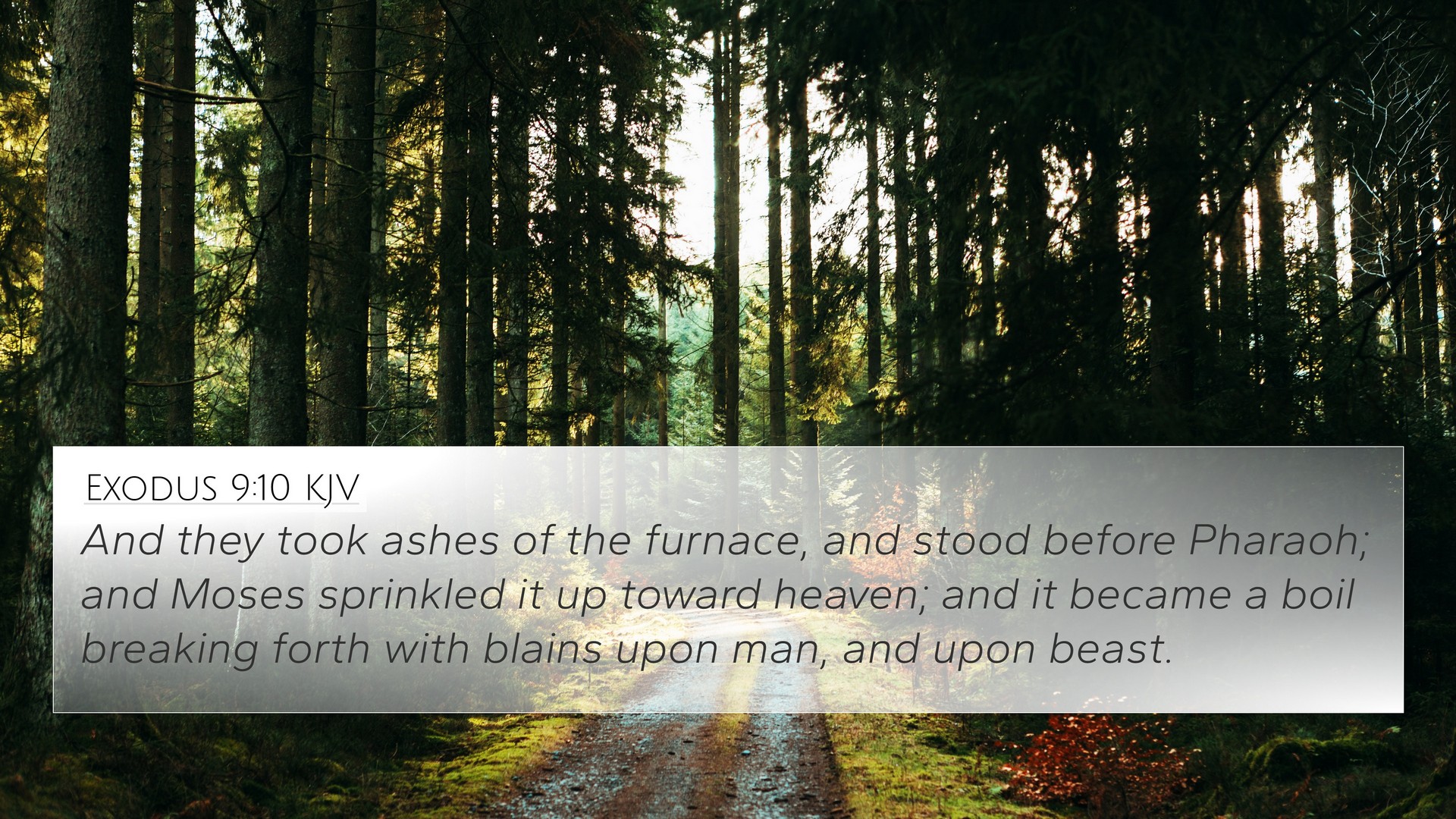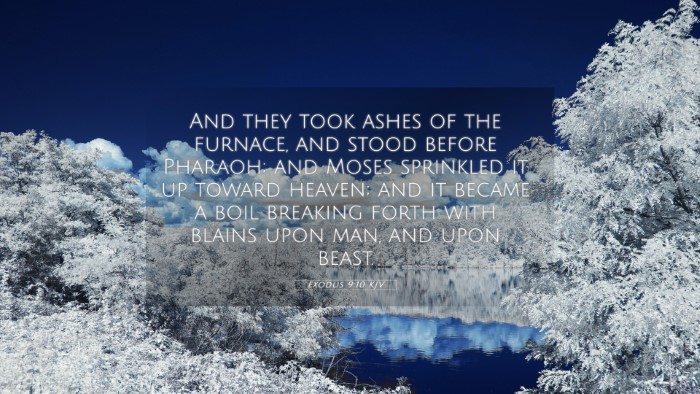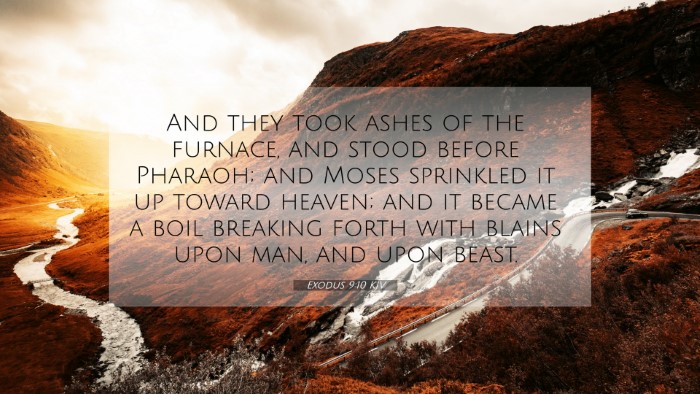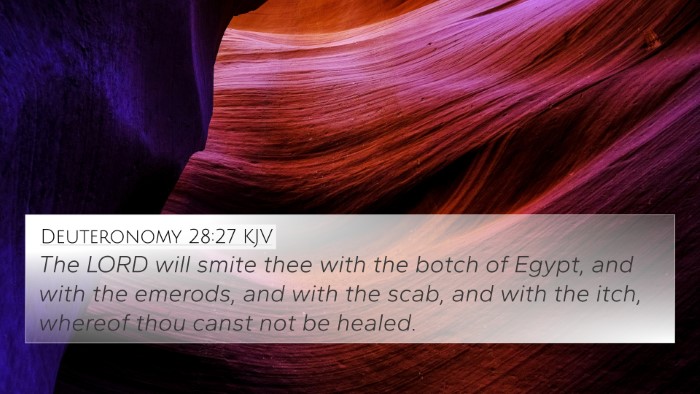Understanding Exodus 9:10
Exodus 9:10 states: “So they took ashes of the furnace, and stood before Pharaoh; and Moses sprinkled it up toward heaven; and it became a boil breaking forth with blains upon man, and upon beast.” This verse is a powerful snippet from the narrative of the plagues of Egypt, illustrating the severity of God’s judgment against Pharaoh and Egypt for their persistent disobedience.
Contextual Analysis
This act symbolizes not only a physical affliction brought upon Egypt but also a spiritual reality: the refusal to heed God's commands leads to dire consequences. Within this verse, the action of Moses taking ashes from the furnace indicates that God's judgment was unavoidable.
Commentary Insights
-
Matthew Henry**: Henry emphasizes the significance of the ashes, describing them as a symbol of the worthless and contemptible. The boils that emerged were a visible reminder of the consequences of sin and rebellion against God.
-
Albert Barnes**: He notes that this judgment directly attacked the Egyptian god of health, Imhotep, further illustrating that God was demonstrating His supremacy over the false gods of Egypt.
-
Adam Clarke**: Clarke interprets the act of Moses sprinkling ashes towards heaven as an invocation of divine power, signaling that the plague was ordained by God and underscoring His authority over all creation.
Bible Verse Cross-References
To fully appreciate the profound implications of Exodus 9:10, one can draw several connections to other relevant passages. These connections enhance our understanding of the themes of judgment, rebellion, and God's sovereignty throughout scripture:
- Exodus 5:1-2 - The initial demand from Moses to Pharaoh to let the Israelites go, setting the stage for the confrontation.
- Exodus 7:14-18 - The first interactions and plagues, contrasting the hardened heart of Pharaoh.
- Exodus 8:18-19 - The magicians of Egypt acknowledge God’s finger at the plague of lice, recognizing a higher power at play.
- Job 2:7 - Job experiences boils as a test of faith; there is a thematic connection in suffering and purification.
- Isaiah 66:24 - A prophecy that speaks of suffering for those who opposed God, drawing a parallel to the consequences seen in Exodus.
- Romans 1:18 - The wrath of God revealed against all ungodliness, showcasing a similar theme of divine judgment.
- Revelation 16:2 - The pouring out of the bowls of God's wrath in the end times reflects the ultimate consequence of rejection of God.
Thematic Connections
This verse holds numerous thematic connections, which contribute significantly to our understanding of Biblical narrative and theology:
- Judgment Against Pride: Just as Pharaoh's pride led to his downfall, God's judgment often targets arrogance and disobedience.
- Suffering as a Tool for Redemption: The physical afflictions depicted serve to show God's desire for repentance, a theme echoed throughout both Testaments.
- Divine Sovereignty over False Deities: Each plague, including boils, systematically dismantles the claims of Egyptian gods, revealing their impotence.
- Call to Humility: The boils symbolize a call for humility and recognition of God’s supreme authority, which resonates with Israel's later struggles.
- Fulfillment of Prophecy: The plagues serve as a fulfillment of God's promises to Israel regarding their deliverance and judgment on their oppressors.
Conclusion
Exodus 9:10 reveals the seriousness with which God regards rebellion and disobedience. This verse demonstrates that God, in His righteousness, will execute judgment while still extending an opportunity for repentance. The cross-references provided elucidate how interconnected these biblical truths are, offering a broader perspective on the theme of divine authority and the consequences of sin.
Tools for Further Study
To delve deeper into the themes and interpretations discussed, consider utilizing the following tools:
- Bible Concordance: A valuable resource for locating where specific words and themes appear throughout scripture.
- Bible Cross-Reference Guide: Helps trace thematic connections across both Testaments effectively.
- Cross-Reference Bible Study: An approach that focuses on linking scriptures to enhance understanding.
- Bible Reference Resources: Ensure access to detailed commentaries and analyses to study verses in depth.
- Comprehensive Bible Cross-Reference Materials: Employ these for a thorough examination of interrelated biblical texts.
Engaging in cross-referencing Biblical texts provides invaluable insight, enhancing one’s understanding of scripture, the interconnectedness of biblical teachings, and the timeless applications of these narratives in our lives today.



